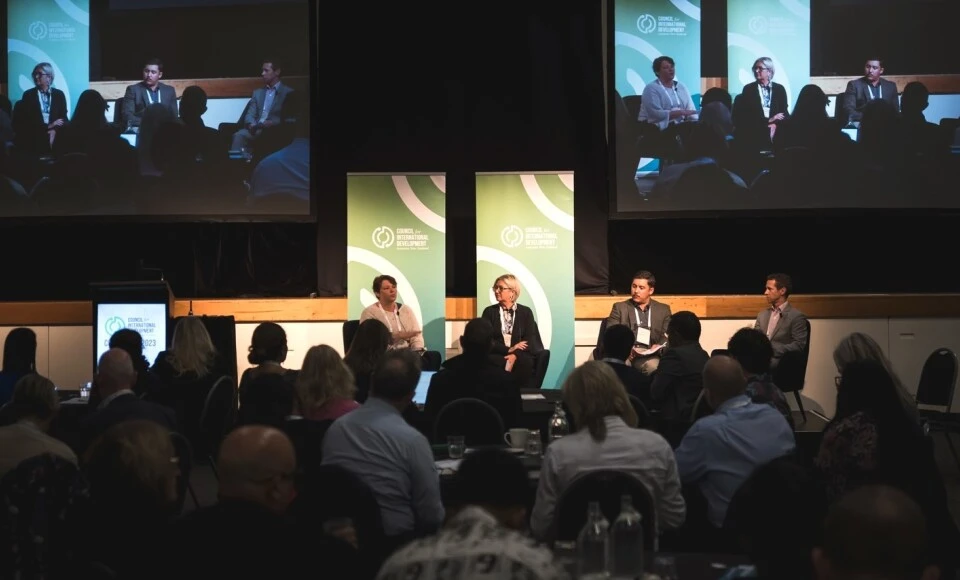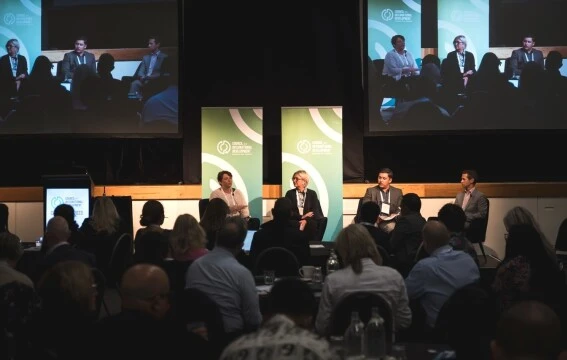Building relationships and explaining our role in international and domestic emergencies
19 October 2023


Viv Euini, our Director of International Operations, has a busy schedule building relationships and creating understanding about our international humanitarian role.
In late September, she participated in two panel discussions at the Council for International Development’s annual conference in Wellington. ‘Deeper Partnerships to Navigate Uncertain Futures’ attracted about 200 people from non-government organisations, government and media.
In a panel discussion ‘Challenges and learnings of delivering humanitarian aid in conflict zones,’ Viv described our auxiliary role to government, and our part in an international movement - a touch point for resources and access to most countries, enabling us to respond to humanitarian need.
Viv also explained how we are governed by our seven fundamental principles and highlighted our impartiality, independence and neutrality showing no matter who a person is or where they come from, if they need humanitarian help, we will act. We don’t take sides.
Viv also described the importance of allowing time for local teams to assess the situation for affected populations when a disaster hits a country. This enables them to make the call for appropriate relief supplies. She said, “while it is in everyone’s nature to want to provide relief straight away, experience has shown that providing supplies without this assessment leads to delays in the necessary aid reaching those who need it most.”
In another panel discussion ‘Domestic Emergency Response vs International Emergency Response,’ Viv focused on our domestic emergency work supporting the lead agency dealing with an emergency or disaster, such as National Emergency Management Agency, (NEMA) leading responses to disasters, Fire and Emergency, New Zealand (FENZ) for fire, or New Zealand Police for terrorism. Our support role is mandated under S14 of the National Emergency Plan. “I had great feedback and felt there was more understanding about our role both domestically and internationally. It’s always good to connect with the international development community and hear about best practice in the sector, and how we can continue to work collaboratively,” said Viv.
Global conference on international delegate deployments
Next up for Viv was a three-day global conference in Paris on international delegate deployments, in early October. International leads from National Societies across the world get together to hear from each other. They also receive updates from the International Federation of Red Cross and Red Crescent Societies (IFRC) and the International Committee of the Red Cross (ICRC) on support for international delegates, and surge requirements – roles needed in the various emergencies around the globe. This year 15 National Societies attended. “Due to Covid restrictions we’ve been absent from the last four meetings, so it’s been vital to reconnect with counterparts, and meet new colleagues, and share updates - which are often gems of knowledge - from each other's National Societies,” said Viv.

Viv Euini with other participants at the international delegate deployments conference
Viv’s presentation focused on the new structure within Emergency Management and International and the benefits of being more closely aligned with our domestic emergency operations. “If we have a catastrophic event in Aotearoa New Zealand, our international team can reach out and tap into resources across the global movement. More funding means more people can respond. On the flip side, we want to enable more of our Red Cross people such as Disaster Welfare and Support teams to deploy as delegates and for them to share their experiences and knowledge when they return.”
Localisation was also a focus during the conference. This is the move toward empowering and supporting local specialists to respond in their own country which is experiencing a disaster. Local people have an intrinsic knowledge of the culture, language and the communities affected which makes it easier to engage, gain access and acceptance more easily than outsiders.
The International Federation of Red Cross and Red Cresent Societies (IFRC) and the International Committee of the Red Cross (ICRC) both provided updates, including new tools, processes and policies.
“It was a great opportunity to connect and reconnect with colleagues, sharing information and swapping ideas which is so much more effective when you are face to face,” said Viv.
More information
International Delegate Programme
- We recruit skilled people and train them to work in international humanitarian and development roles overseas.
Apply to be an international delegate
Find missing family
- Our Restoring Family Links team is on standby to receive enquiries from people living in Aotearoa New Zealand who have lost contact with loved ones due to the disaster, conflict or migration.
Find missing family overseas
Donate to support our work
- If you’d like to support our work around the world and here in Aotearoa New Zealand, you can donate to our Where the Need is Greatest Fund. Donations to this fund support all our humanitarian work and help us respond to disasters and crises, wherever the need is greatest.
Give hope to people in need, donate to Where the Need is Greatest
Header image credit: Viv Euini presenting at the Council of International Development annual conference.
